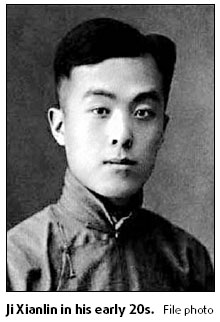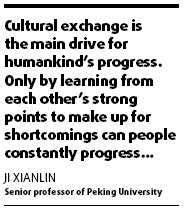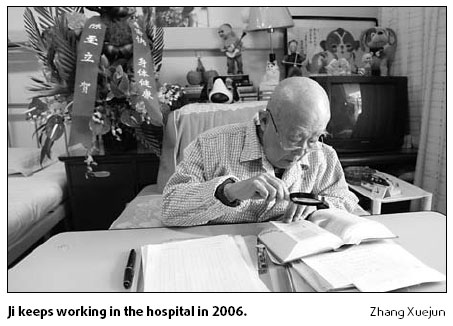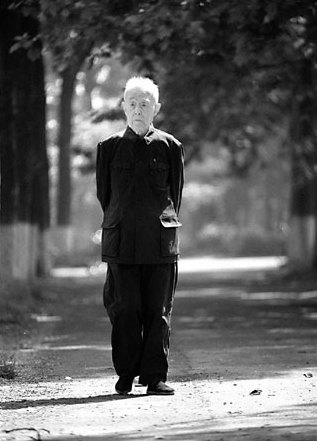The reluctant master
|
Ji Xianlin strolls on Peking University's campus, his workplace for 63 years, in October, 1997. Tang Shizheng |
Premier Wen Jiabao visited Beijing's No 301 Hospital on Saturday to pay his respect to a very dear friend. Unfortunately the Premier was unable to offer his last goodbye in person.
Ji Xianlin, dubbed by many as the "master of Chinese culture" had died three hours earlier of heart attack. He was 97.
Premier Wen said he had planned to celebrate Ji's 98th birthday next month and was looking forward to discussing many different issues.
Ji's wise counsel was always in big demand over his 70-year academic career.
He was one of China's greatest scholars of history, ancient languages and culture.
Ji repeatedly asked the media to stop calling him a "maestro in traditional Chinese culture" but despite the protests, the "master" title stuck.
On his way to becoming a cultural icon, Ji personally taught more than 6,000 students and about 30 of these young people went onto becoming ambassadors serving across the four corners of the globe.
According his students and colleagues, China's academic giant was always an amiable old man who wore bleached khaki suits, soft cloth shoes, and carried an old-fashioned schoolbag.
They also remember his utmost respect for people, his humility and his tenderness for little animals, especially cats.
Ji spent his last moments in No 301 hospital, Beijing, with his son Ji Cheng accompanying by his side.
"Ji's leaving is the ending of an era," says Zhao Rengui, professor of Beijing Normal University. "There are fewer and fewer masters accomplished like him nowadays."
Son to an impoverished rural family in Linqing, Shandong province, Ji was admitted to Tsinghua University in 1930 and majored in Western literature.
Five years later he went to Gottingen University in Germany as an exchange student, majoring in Sanskrit and lesser-known ancient languages like Pali.

He would spend more than 10 years in Germany and received his PhD in 1941.
In Germany, Ji met Irmgard, his friend's landlord's daughter, who helped him type his dissertation, because he could not afford a typewriter. The two soon fell in love but Ji was already married in China and made the hard decision to give up the relationship and returned to China in 1946.
In his book Ten Years in Germany (Liude Shinian), he wrote of the relationship. When he re-visited Gottingen in 1980, he tried to find Irmgard but failed.
In 2000, a Hong Kong reporter, who was making a documentary of Ji, went to the city and found the lady, who was still single. The typewriter she used to help Ji was still on her desk.
On his return in 1946 he became a professor at Peking University and soon founded the department of Eastern languages in the university.
During the "cultural revolution" (1967-77), he spent five years translating the 2.8 million-word ancient Indian epic Ramayana from Sanskrit into Chinese.
On January 26, 2008, the government of India awarded Ji the Padma Bhushan, one of the country's top civilian awards.

In 1978, Ji became vice president of Peking University and director of the Chinese Academy of Science's Research Institute on South Asia. He also served as chairman of various professional organizations, including the Chinese Foreign Literature Association, the Chinese South Asian Association and the Chinese Language Society.
Ji published 11 academic books and over 200 papers in more than 10 academic fields, including Chinese cultural research, comparative literature, and Sanskrit.
Ji maintained that "Cultural exchange is the main drive for humankind's progress. Only by learning from each other's strong points to make up for shortcomings can people constantly progress, the ultimate target of which is to achieve a kind of Great Harmony."
In 2003 Ji moved into No 301 hospital because of health problems, but continued reading and writing there.
The day before his passing he was talking to an editor about new book plans and wrote in calligraphy.
In 1986, he wrote an article titled A Few Words for Hu Shi (1891-1962), who was a famous and controversial Chinese scholar and diplomat. His piece shocked the literary world.
Back in the mid 1980s, Hu was seen in a very negative light and few dared to touch this taboo topic.

Ji's friends worried about him for writing such a risky article, but he maintained that even if Hu did make unforgivable mistakes, his contributions to modern Chinese literature should not be ignored.
Winning support from many scholars later, his article broke the ice for the re-evaluation of the modern Chinese literature.
"One thing about Ji that deserves our admiration is that he never fears to tell the truth. He speaks out what he thinks," says Zhao.
In 1998, Ji published Memoirs from the Cowshed (Niupeng Zayi), a resonating book recording his experience in the "cultural revolution" (1966-76) and reflection on the turmoil.
"This small book is written with tears and blood," he wrote. "It is my biggest joy to finish it when I am alive. It is the best gift I can give to the young generations."
In the "cultural revolution", Ji thought of committing suicide once after suffering terrifying torture.
He survived and worked as a concierge of students' dormitory. During that time he finished the translation of Ramayana, often working secretly on paper slips.
In Cowshed, Ji calls for those who have experienced the "cultural revolution" to reflect on their past and inner world, and learn a real lesson from the turbulent decade.
"I have a strong faith that if the process of such a disaster is truthfully recorded, it will be a mirror for our great nationality," he once said. "To look at ourselves in the mirror often will be very beneficial."
Chen Pingyuan, professor of Peking University, says the book reveals his reflection on politics. "He is never restricted to his major. We miss such scholars who focus not only on academics, but also social and political reality," Chen says.
Ji won affection from general public also for his unassuming personality and humility.
Twenty years ago, a freshman, busily going through enrollment procedures on his first day at Peking University, ran into an old man on campus. In a frantic rush, he asked his senior to look after his luggage.
When he remembered his luggage hours later he rushed back and found the old man sitting by his bags in the searing sun and reading a book.
The young fellow thanked him and left, only to find the same old man sitting on the rostrum on a welcome ceremony the next day.
He realized the minder of his bags was the vice-president of Peking University.
"For a new student to Beijing, the luggage was his most precious belonging. I must treat his trust seriously," Ji recalled the story to his friend, journalist Tang Shizeng.
In his 2007 book Memories from the Hospital Bed (Bingta Zaji), he urged to remove three titles he had long been honored: master of traditional Chinese culture, academic maestro and national treasure.
In an interview with CCTV, he said it was because the titles were not "truthful" and he was not that great.
Mou Jie, editor of some of Ji's books, remembers Ji as a very modest man.
"He was never arrogant, although people call him a master," she recalls.
"He was always low key, and always believed more efforts were needed to improve the process of study."
Peking University, where Ji worked for 63 years, announced Ji's passing in a statement calling him a "senior professor" instead of "master", a title Ji urged the nation's top university to remove many times.
They remained true to his wishes.
(China Daily 07/13/2009 page8)















